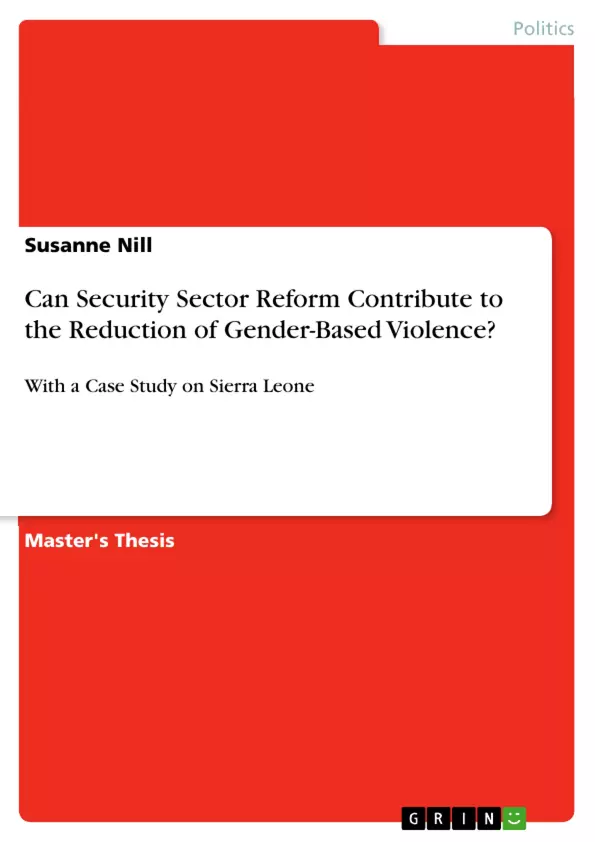The ambition of this thesis is to investigate the significance of
gender issues for reforming the security sector. Further on it will be
analyzed which gender-strategies are crucial for police reform and to
which extent gender-sensitive police reform (GSPR) can contribute to a
reduction of violence against women. The case study shall examine to
which extent gender issues were integrated in GSPR in Sierra Leone.
Based on these findings, this analysis will develop recommendations
how gender can be integrated successfully into security sector reform.
The theoretical part of this paper illustrates the concept of security
sector reform and its meaning for peace-building and development. In
addition, relevant dimensions and actors are introduced combined with
the exemplification of influencing factors and potential obstacles.
Afterwards the concept of gender is discussed, including its relevance
for development cooperation as well as a description of gender-based
violence and its consequences. The theoretical part concludes by
merging these two concepts and illustrates the relevance and strategies
of gender-sensitive police reform. The second part of this analysis
focuses on gender and police reform in Sierra Leone. This chapter
begins with a brief description of the civil war in Sierra Leone as well as the prevalence of gender-based violence. Afterwards the chapter
analyses to which extent gender-sensitive strategies were integrated in
police reform. The paper concludes with recommendations for further
gender-sensitive strategies in the security sector and argues if effective
police reform can reduce the emergence of gender-based violence.
Inhaltsverzeichnis (Table of Contents)
- Introduction
- Relevance of Gender for Security Sector Reform
- The Concept of Security Sector Reform
- Elements and Actors
- Influencing Factors and Relevant Preconditions
- The Meaning of Gender for Development Cooperation
- Gender-Based Violence
- Sexual Violence in Armed Conflicts
- Consequences of Gender-Based Violence
- Integrating Gender in Security Sector Reform
- Strategies to Integrate Gender in SSR
- Gender-Sensitive Police Reform
- Mandate
- Operating Practices
- Working Environment and Recruitment
- Case Study on Sierra Leone
- Civil War
- Prevalence of Gender-Based Violence
- Security Sector Reform
- Gender-Sensitive Police Reform
- Strengths and Shortcomings
Zielsetzung und Themenschwerpunkte (Objectives and Key Themes)
This Master's thesis investigates the potential contribution of security sector reform (SSR) to reducing gender-based violence, using Sierra Leone as a case study. The analysis explores the relevance of gender within the context of SSR and examines the challenges and opportunities of integrating gender into the reform process. The research aims to contribute to the understanding of the complex interplay between security, gender, and development, particularly in post-conflict settings.
- Gender integration in security sector reform
- The role of gender in development cooperation
- The impact of gender-based violence on security and development
- The experiences and challenges of gender-sensitive police reform
- The potential for SSR to contribute to the reduction of gender-based violence
Zusammenfassung der Kapitel (Chapter Summaries)
- Introduction: The thesis introduces the research topic, its relevance, and the research questions guiding the analysis. It outlines the methodology and provides a brief overview of the case study of Sierra Leone.
- Relevance of Gender for Security Sector Reform: This chapter explores the significance of gender within the context of security sector reform. It discusses the various ways in which gender considerations impact the design and implementation of SSR processes.
- The Concept of Security Sector Reform: The chapter provides a comprehensive overview of the concept of security sector reform, delving into its key elements, actors involved, and influencing factors.
- The Meaning of Gender for Development Cooperation: This chapter examines the importance of gender in development cooperation, with a particular focus on gender-based violence. It explores the causes, consequences, and various forms of gender-based violence, including sexual violence in armed conflicts.
- Integrating Gender in Security Sector Reform: The chapter analyzes different strategies and approaches for integrating gender considerations into security sector reform. It examines the principles of gender-sensitive police reform, focusing on mandate, operating practices, and working environment and recruitment.
- Case Study on Sierra Leone: This chapter delves into the case study of Sierra Leone, providing a detailed analysis of the country's civil war, the prevalence of gender-based violence, and the ongoing security sector reform processes. It examines the implementation of gender-sensitive police reform in Sierra Leone, identifying both strengths and shortcomings.
Schlüsselwörter (Keywords)
The primary keywords and focus topics of this thesis include security sector reform, gender-based violence, development cooperation, gender integration, police reform, Sierra Leone, post-conflict societies, and women's rights.
Frequently Asked Questions
What is Security Sector Reform (SSR)?
SSR is the process of transforming a state's security institutions (police, military, judiciary) to make them more effective, accountable, and respectful of human rights.
How can police reform reduce gender-based violence (GBV)?
By implementing gender-sensitive practices, recruiting more female officers, and creating specialized units to handle domestic and sexual violence cases.
What was the context of the SSR case study in Sierra Leone?
The study examines how Sierra Leone integrated gender issues into its security sector following a brutal civil war characterized by high levels of sexual violence.
What are the obstacles to gender-sensitive police reform?
Obstacles include deeply rooted patriarchal norms, lack of funding, and resistance within traditionally male-dominated security structures.
Why is gender integration important for development cooperation?
Gender equality is a prerequisite for sustainable peace and development; addressing GBV improves overall community security and economic stability.
- Citation du texte
- Susanne Nill (Auteur), 2011, Can Security Sector Reform Contribute to the Reduction of Gender-Based Violence?, Munich, GRIN Verlag, https://www.grin.com/document/172034



